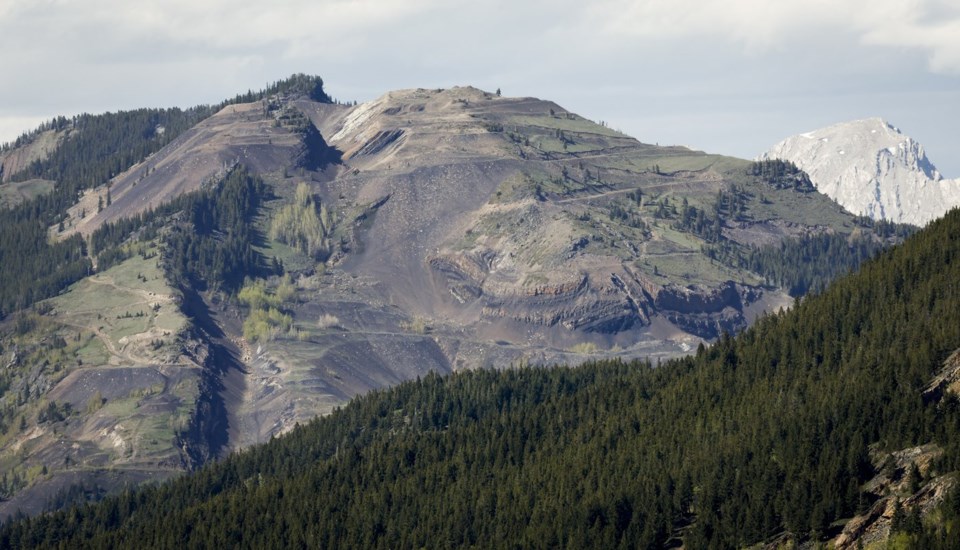The Alberta Energy Regulator approved on Thursday a controversial coal exploration project on the eastern slopes of the Rocky Mountains.
Northback Holdings Corp.'s project at Grassy Mountain was rejected in 2021, when a panel ruled likely environmental effects on fish and water quality outweighed potential economic benefits.
The project, located on an inactive legacy coal mine site in the Municipal District of Ranchland, was revived two years later. Last year, it was exempted from the Alberta government's decision to ban open-pit coal mines, because Northback's application was considered an "advanced" proposal.
A written decision from the regulator says it determined approving the project is in the public interest and the project won't have negative effects on water quality or wildlife, which many at public hearings argued will happen.
The decision grants Northback permits to drill and to divert water to the site, which was also a concern raised by farmers in drought-ridden parts of southern Alberta.
The approved deep drilling permit will allow Northback to drill more than 150 metres underground on both public and private land in its search for coal deposits.
The company will only be able to draw water from a nearby end pit lake that it owns and that's not directly connected to other water bodies or rivers, the decision says.
The decision notes that it's possible there will be some runoff from the lake, but it had been determined the project won't have any effect on water quality or quantity downstream.
It also says the potential for the project to generate toxic selenium is unlikely, "because there will be no excavation, no coal-mining operations and no new waste rock piles created."
"If the existing waste rock piles are not elevating downstream selenium levels, it is reasonable to conclude that these exploration activities are unlikely to elevate selenium levels," the decision says.
The regulator also determined that potential harm to wildlife is unlikely, as no new roads are to be constructed as part of the project.
The regulator was satisfied overall with the project's public interest, saying as it would provide employment opportunities to nearby residents, including First Nations communities, while allowing the company to continue investing in the area.
"We assessed the social and economic effects of the exploration program and found it to be positive," the decision says, adding that Northback plans to spend at least $2.5 million locally as part of the exploration.
"While the magnitude of the economic impacts may appear modest, they are proportional to the program scale and duration."
The decision says the company has spent over $1 billion since 2015 trying to advance the project but that it wasn't a consideration for the regulator.
The project will also give Albertans additional information on the scale of the coal deposit at Grassy Mountain, says the decision.
"The exploration program will contribute to the ongoing evaluation of this coal resource and, based on our assessment, will do so in an orderly, efficient and environmentally responsible manner," it says.
Rita Blacklaws, a spokesperson for Northback, said in an email the company thanked the regulator for the decision.
"With this outcome, Northback continues our commitment to bring benefits to Albertans while adhering to the highest environmental standards," Blacklaws said.
Opposition NDP environment critic Sarah Elmeligi said the decision is wrong.
"Albertans have been clear they do not want coal mining on the eastern slopes," she said.
"What a horrible day for Alberta."
Energy Minister Brian Jean said the government respects the regulator's "carefully considered decision on this application," noting it isn't an application to mine. He said Northback will be responsible for reclamation related to the exploration work.
"We reiterate our commitment to protect Alberta's waters and ensure that any development in the eastern slopes is done to the highest environmental standards," Jean said in a statement Thursday.
The decision followed days of public hearings in December and January, as well as a non-binding vote last year in the nearby community of Crowsnest Pass. About 72 per cent of voters said they were in favour of the project.
The regulator notes that concerns were raised in the hearings that granting exploratory permits would lead to a full-blown coal mine. It says that possibility couldn't be factored into the decision-making process.
"Exploration is only one step taken by a resource company in the long and complex series of activities that may or may not lead to the development of a mine," the decision says. "Accepting the need for this exploration program does not constitute approval of a coal mine.
"If, in the future, Northback decides to proceed with mine applications at Grassy Mountain, it must follow a rigorous regulatory process that all resource development applications must follow."
Conditions attached to the exploratory permits require the company to dispose of drilling waste to the regulator's satisfaction, follow erosion control and weed management plans, and adhere to recommended environmental mitigation measures.
The company's permits are valid for five years, with the last three years to be set aside for reclamation work.
— With files from Lisa Johnson in Edmonton and Bill Graveland in Calgary
This report by The Canadian Press was first published May 15, 2025.
Jack Farrell, The Canadian Press




